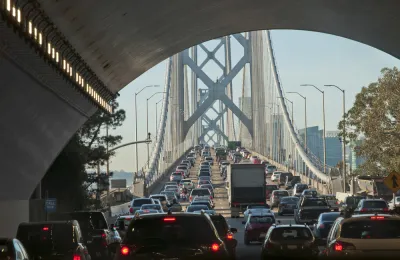Joe Cortright argues for a new approach to the discussion about the country's dependence on automobiles: talk about responsibility, not morals.

Joe Cortight suggests that there is a problem with the framework by which transit boosters, cyclists, planners, environmentalists, and safety advocates talk about cars:
…the problem is not that cars (or the people who drive them) are evil, but that we use them too much, and in dangerous ways. And that’s because we’ve put in place incentives and infrastructure that encourage, or even require, us to do so.
Faced with the question of how to reduce the negative impacts of driving, by reducing driving, the advocates listed above are locked in a political battle that is often contentious.
"Bitter and acrimonious flamewars between people who are convinced that one side or the other is trying to run us off the road will surely be unproductive," writes Cortright. Thus, he suggests a new way to argue in favor of reforms:
This isn’t about creating a “disincentive for car use,” but, as a matter of fairness and practicality, dropping what have essentially been subsidies for financially and socially expensive and dangerous behavior.
FULL STORY: Let’s not demonize driving—just stop subsidizing it

Analysis: Cybertruck Fatality Rate Far Exceeds That of Ford Pinto
The Tesla Cybertruck was recalled seven times last year.

National Parks Layoffs Will Cause Communities to Lose Billions
Thousands of essential park workers were laid off this week, just before the busy spring break season.

Retro-silient?: America’s First “Eco-burb,” The Woodlands Turns 50
A master-planned community north of Houston offers lessons on green infrastructure and resilient design, but falls short of its founder’s lofty affordability and walkability goals.

Test News Post 1
This is a summary

Analysis: Cybertruck Fatality Rate Far Exceeds That of Ford Pinto
The Tesla Cybertruck was recalled seven times last year.

Test News Headline 46
Test for the image on the front page.
Urban Design for Planners 1: Software Tools
This six-course series explores essential urban design concepts using open source software and equips planners with the tools they need to participate fully in the urban design process.
Planning for Universal Design
Learn the tools for implementing Universal Design in planning regulations.
EMC Planning Group, Inc.
Planetizen
Planetizen
Mpact (formerly Rail~Volution)
Great Falls Development Authority, Inc.
HUDs Office of Policy Development and Research
NYU Wagner Graduate School of Public Service




























